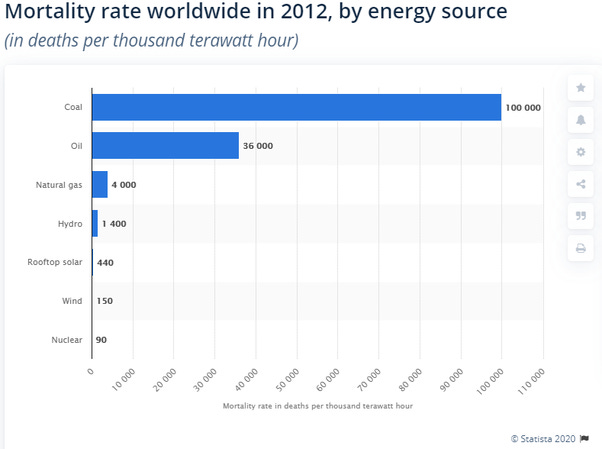From Claire—This is the first part of our Energy Week Cosmopolicast, which went on for two full hours. We’ll post the second half tomorrow. Robert Zubrin and the Lewises, père et fils, duked it out in an all-out brawl with Casey Handmer, Alexander Hurst, and Benjamin Wolf. Monique, Ron, Vivek, and I tried to keep our guests from punching below the belt. I know we always say, “This was our best Cosmopolicast yet!” but truly, this one’s a contender. If you think providing energy to the world’s 7.8 billion people must be a simple matter, listen to this one through.
Below, Robert Zubrin makes the case for nuclear and explains why he has no patience for the Greens. (To cancel your subscription, subscribe now.)
The Case for Nuclear Power
By Robert Zubrin
If you oppose carbon taxes, you will be pilloried as a climate-change denier, but if you oppose nuclear power, you will be warmly embraced by those who call themselves environmentalists. Consider this contradiction carefully. We may understand a great deal about the Green movement by studying it.
Energy is the lifeblood of civilization. Every aspect of our lives depends upon it. Energy makes modern agriculture possible; without energy, we could not dream of feeding the whole world. We need energy to transport our food, to run life-saving machines in our hospitals, to clothe ourselves and to shelter ourselves.
It is not just carbon emissions that have risen since the Industrial Revolution. Every measure of quality of life has risen, some of them exponentially. This is no coincidence. The wealthier a country is, the more energy it uses; the relationship is linear:
But more than a billion people on this planet have no electricity, and three billion more suffer from shortages. Lacking electricity is deadly and immiserating. Without reliable electricity, a society can’t escape back-breaking poverty, lower its rate of infant and maternal mortality, or raise life expectancies to the standards of the developed world. Instead, people starve or languish from malnutrition and die of wholly preventable disease.
When considering energy issues, our first concern should be the world’s most pressing moral problem: poverty. Roughly a billion of our fellow human beings live on less than a dollar day. If you have never been to a place where people are that poor—this kind of poverty does not exist in any Western country—you can only imagine it; you cannot fully grasp what it means. The existence of poverty so dire, in the modern world, is a crime. It is the world’s most serious human rights crisis.
Abundant, inexpensive energy is the remedy. When politicians speak of raising the cost of energy by, for example, levying carbon taxes, keep in mind that the people most severely penalized when the cost of energy rises are not the citizens of wealthy countries, but the poorest people in the world. If ending poverty does not weigh on your mind as a high moral priority, it is either because you don’t truly understand the suffering and indignity it represents or because you are morally insensate.
Many now demand the world cease using fossil fuels immediately. Too few seem to understand that unless they have a plan immediately to replace fossil fuels by an equally inexpensive and abundant energy source, they are calling to condemn the world’s poor to famine, squalor, misery, and death—and they are calling, too, for greatly enlarging the ranks of the desperately poor.
Many advocates of the Green movement claim that climate change is an existential threat. The standard meaning of this phrase is “a serious risk of eradicating all human life,” or even “all life on planet Earth.” Yet with all human life—even all life on Earth—allegedly at stake in reducing carbon emissions, they still militantly oppose nuclear power!
Such people, clearly, are not drawn to the Green movement because they are good at rationally assessing risk. Indeed, here is a profound and disconcerting truth about quite some number of key figures in the environmental movement: Their thinking is shot through with unreason and anti-human Malthusianism. Charitably, we may assume rank-and-file Greens do not fully understand what it would mean to deprive the poor of energy. Their embrace of policies that would in their impact be genocidal is unwitting. But original figures in the environmental movement, such as Paul Ehrlich, were indeed explicitly genocidal.
In recent years, a more rational ecomodernist movement has emerged. Some climate-crisis alarmists are willing to take their own ideas seriously and thus entertain nuclear power. This has produced a blossoming literature among a minority of environmentalists in favor of nuclear energy.
But you do not need to accept that global warming is an existential threat to agree with them. The one-degree Celsius increase in global temperatures since 1870 has scarcely affected most of the world; for Americans, it has been equivalent to moving 90 miles to the south. But rising CO2 atmospheric concentrations could indeed have a significant effect on marine life, particularly if concentrations continue to rise, and they will if the world remains dependent on fossil fuels.
What’s more, fossil fuels are enormously dangerous, quite apart from the issue of climate change. Conventional pollution from the combustion of fossil fuels causes millions of deaths every year and sickens many more; treating these illnesses costs the world billions of dollars. If human life and health matter to you, you must support greatly expanded production of energy, but such a massive expansion cannot be based on fossil fuels.
This means you must support nuclear power. It is the only proven, reliable, and scalable source of non-carbon energy on earth.
Yet for decades, environmentalists have sabotaged the nuclear industry. They have terrified the public with specious claims about the danger of nuclear power. Why?
In 1954, US Navy captain Hyman G. Rickover invented the pressurized water reactor, or PWR, as a nuclear power source for the submarine Nautilus. This design has since been the basis for the commercial nuclear industry worldwide. It is a sound engineering choice, because the PWR and related designs, such as the boiling water reactor and the pressurized heavy water reactor, use water to cool the reactor and moderate—or slow down—its neutrons, making them more effective as fission initiators. If a water-cooled and moderated reactor loses coolant, or even experiences excessive boiling, it loses moderation and thus power. It is physically impossible for a runaway chain reaction to occur with such a design.
This is why there has never once been a runaway chain reaction in any of the thousand-odd water-cooled and moderated nuclear reactors operating around the world, on land and at sea, for the past seven decades. Nor has even one person been killed by a radiological release from a PWR. This makes the PWR the safest method of producing energy ever devised.
To judge the risk of an energy system, we assess the risk per unit of energy. To do this, we divide the energy the system produces, on net, by the risk it poses to human health. For this is to be meaningful, the calculations must be based on the entire energy cycle. To weigh the risk of nuclear power against solar, for example, you can’t compare a snapshot of a fully built nuclear power plant to one of a solar farm. The assessment must include the risk of mining raw materials like uranium, for example, or the risk of using fluorine to reduce sand to silicon: Fluorine is highly corrosive; the process used to make solar panels creates massive amounts of toxic fluorine compound wastes. You must calculate the risk involved in transporting component parts, construction, manufacturing, and installation.
The claim that nuclear power is unacceptably dangerous isn’t just subtly false. It’s wildly false. The reality is exactly the contrary. Per unit of energy, there is no safer source. Nuclear power is not only safer by far than fossil fuels—even excluding the claim that fossil fuels will wipe out the human race—but safer than wind, safer than hydropower, and safer than solar. Why? Because mining and construction are unusually dangerous jobs, and lots of people fall off roofs or electrocute themselves installing solar panels.
Indeed, calculated in this fashion—and this is the only rational way to calculate it—solar power is not just more dangerous than PWR nuclear power, but more dangerous than Chernobyl. In 2005, the World Health Organization concluded that fewer than 50 deaths could be firmly attributed to that disaster, almost all among the highly exposed rescue workers. “By and large,” reported the chairman of the investigative team, “we have not found profound negative health impacts to the rest of the population in surrounding areas, nor have we found widespread contamination that would continue to pose a substantial threat to human health, within a few exceptional, restricted areas.” Assume the upper figure, 50 deaths. Nuclear power thus results in 0.0012 deaths per terawatt hour.
But no reactor in the West is as unsafe as Chernobyl. The Soviet RBMK reactor that exploded used a graphite moderator with a water coolant. It therefore had nothing like the inbuilt and ironclad safety feature of a PWR. Quite the contrary—when it lost its water coolant, its reactivity soared (because water absorbs some neutrons, but graphite does not, making graphite, by itself, a better moderator than the mixture of graphite and water). The reactor wildly overheated, setting off a steam explosion. That’s what blew the reactor apart. But even that would have had no serious consequences if the reactor had only had a containment building, as all power reactors do in every civilized country. No such system ever could have been licensed in the United States, for example.
At this point, fanatics start raving on about Three Mile Island and Fukushima. Contrary to myth, these accidents prove how safe modern nuclear plants really are. No one died at Three Mile Island. It was the only mega-catastrophe in history in which no one so much as suffered a hangnail. The whole city of Fukushima was destroyed by an earthquake and tidal wave, yet the International Atomic Energy Agency confirmed, in 2015, that not one person was killed or sickened by radiation poisoning from Fukushima’s reactors.1 The World Health Organization projects zero increase in miscarriages, stillbirths or physical and mental disorders in babies born after the accident, not even among workers at the plant. The entire death toll was owed to the earthquake, the tsunami, and the government’s panicked decision to evacuate the elderly and vulnerable—a decision that proved far more dangerous to them than the crippled power plant.
Air pollution, by contrast, kills 4,200,000 people every year. No matter which year you choose, you will find that year in, year out, nuclear power is safer than any other source of energy. Mountains of quantitative data establish this.
What’s more, we now have evidence that when societies abandon nuclear, they shift to fossil fuels, not renewables. Japan closed its nuclear plants after Fukushima owing to public hysteria. Deadly air pollution soared. The vulnerable, as usual, were the biggest losers—people with emphysema and asthma, children, the elderly, and the infirm. Poor people cannot afford to move away from the most polluted areas of cities. Germany, too, closed its nuclear plants owing to public hysteria, initially replacing clean nuclear power with ultra-dirty lignite coal, tripling electricity costs in the process. Compare this to France, which long ago decarbonized. France pursued nuclear power long before anyone was obsessed with climate change. They did so because it’s cheap; it’s safe; and it doesn’t leave you dependent on the whims of Gulf potentates or hostage to the fate of international shipping and pipelines.
Given this, anyone who insists climate change is an existential risk, but nuclear power must be implacably opposed is not an honest environmentalist, but someone with another agenda. Exploring that agenda in depth is beyond the scope of this essay, but I have written about it, at book length, in Merchants of Despair.
This agenda is driven by a pathological ideology that I have termed antihumanism, by which lights the human race is not a miracle to be celebrated and uplifted, but a very cancer upon the earth—a horde of vermin whose unconstrained breeding endangers the so-called “natural” order, and whose ranks must therefore be culled. The chief prophets of this ideology, from Thomas Malthus through Paul Ehrlich, have been enthusiastic advocates of every species of pseudoscientific batshittery, from enforced “population control” to campaigns to stop people from using pesticides or genetically improved crops to protect themselves from malaria and malnutrition. Opposition to nuclear power bubbles up from the same poisoned well. It has nothing to do with protecting the environment; to the contrary, the widespread use of nuclear power would solve many environmental problems—and it would place no constraints on economic growth. The latter part is key. Adherents of antihumanism have trouble articulating the point, but at root, this is what they find this unacceptable. They feel instinctively that human beings do not deserve to live, grow, and flourish. Do you think this an exaggeration? If so, how do you explain people who believe greenhouse gas emissions are an existential threat to humanity but reject nuclear power as “too dangerous?”
The Finnish environmentalists Rauli Partanen and Janne Korhonen recently laid out the case for nuclear power in an unusually competent and accessible way. In The Dark Horse: Nuclear Power and Climate Change, the authors note that civilian nuclear-power plants cannot be used to produce plutonium for bombs. Extended exposure within power reactors turns part of the plutonium 239 bred in them into plutonium 240, which can’t be used to make weapons.
Partanen and Korhonen believe climate change is an existential threat. If you accept this premise, their conclusion in favor of nuclear power is overwhelming and irrefutable. But you do not have to accept the premise to be persuaded by their case. The one-degree-centigrade increase in global temperatures since 1870 may be inconsequential (it is the average warming experienced by an American who moves about 90 miles to the south). But CO2 atmospheric concentrations have increased 50 percent (from 280 ppm to 420 ppm), a significant change in atmospheric chemistry that will have adverse effects on marine life should the trend continue, and it will if economic development around the world remains dependent on fossil fuels. It is an uncontroversial claim that conventional pollution from fossil-fuel power plants is lethal. Climate-change arguments aside, if human life and health matter to you, you should support nuclear power.
The United States invented nuclear power, then showed how it could be used to fight poverty through our Atoms for Peace program. For a time, with bipartisan support, the United States led the world in demonstrating the way this newly understood and mastered force of nature created unlimited possibilities for the future of humanity, on Earth and in space.
This changed in the 1970s. One of our major political parties reversed itself and declared war on nuclear power. The Carter administration aborted the United States’ plans for nuclear-fuel reprocessing and set up a regulatory obstacle course that drowned the nascent industry. Utility construction projects became a legal-intervention free-fire zone. New York governor Mario Cuomo then decided to prevent the new Shoreham plant from going online, showing that any such project might, on a governor’s whim, be turned into a complete loss.
Since then, it has been near-impossible to finance the construction of nuclear power plants. The Clinton administration canceled our breeder-reactor program. The Obama administration stopped the establishment of a waste repository in Nevada. The list goes on. When advocates insist that renewables are less expensive than nuclear and the industry more innovative, they are not accurately or honestly representing the case. Of course nuclear power will be expensive if you create regulatory obstacles like these. Any industry can be made prohibitively expensive by hostile regulation. Germany is not destroying its nuclear industry because building new solar arrays is cheaper than continuing to use already built nuclear power plants. It certainly isn’t. They are doing so because it is part of the ideological agenda of an anti-human movement that falsely advertises itself as “green.”
The fundamental premises of antihumanism are these:
Resources are limited.
Therefore human numbers, activities, and liberties must be severely constrained.
Therefore someone must be empowered to do the constraining.
This thesis is a justification for tyranny and oppression, which is why intellectuals who espouse it have never lacked for sponsors. Thus these ideas return, again and again, despite refutation, over and over. In reality, the world’s resources have expanded radically as the world’s human population and human well-being have multiplied in tandem. In 1800, when Malthus wrote that production could never keep pace with population, global population was one billion and annual income equivalent to US$200 per capita. Today, the world’s 7.8 billion people earn an average US$11,000. The population increased seven times; per capita income increased fifty times; total income multiplied 350 times. Not only did production keep up with population, it multiplied as population cubed!
Malthusianism cannot survive a confrontation with the historic record. Resources have expanded faster than people have multiplied because resources are defined by technology and technology is invented by people. The more people, the more inventions. Inventions are not merely cumulative, but multiplicative. The more inventions there are, the more there is with which to invent.
The 19th-century biologist Ernst Haeckel developed a variant on Malthusianism often espoused by German Greens and their analogues elsewhere. Humans are part of the Earth’s “ecology” (a word Haeckel invented), and are thus supported by and limited to the “carrying capacity” of the soil. This doctrine became popular in the pre-Nazi German youth movement; it was foundational to the Nazi vision of international relations, in which nations were locked in an existential struggle for land. Its acceptance was, and must be, catastrophic. It remains fashionable among German Greens today. Yet it is completely false.
The Earth does not “carry” humanity. Human creativity carries humanity. Humans have not been dependent upon the bounty of nature since we invented agriculture in Neolithic times. We made ourselves more independent of nature by inventing techniques for exploiting fossil fuels, which otherwise do not circulate actively in the biosphere. With our invention of nuclear power, we made our independence complete. With nuclear fission, we can get as much energy out of a ton of uranium as we can from the burning of six million tons of wood. How can anyone claim to love nature when they would sooner burn down a whole forest than make use of a ton of an inorganic element for which the natural biosphere has no use whatsoever?
Down with the Sun
In 1976, the Malthusian ideologue Amory Lovins came up with the idea of the “renewable energy solution” as a justification for the war on nuclear energy. The idea that we could replace fossil fuels with solar and wind power was, and remains, nonsense. (Even Lovins implicitly recognized this fact. He called for using coal as a “bridge fuel” to the no-nuclear energy future.) To call these sources “renewables” is a misnomer; they should be called “unreliables.” Solar energy has been around since the 1950s. It remains erratic in output and weather dependent. Today it supplies 0.5 percent of humanity’s energy needs. Forcing a grid to accept unreliable power systems greatly increases costs, because they must be completely backed up by reliable power sources. These sources are a liability to a grid, not an asset.
Modern civilization was made possible by using fossil fuels, which allowed us to transcend the limits of wind, water, and biomass power. So-called renewables produce nowhere near enough energy to replace our current use, let alone the vast amount more we need to end poverty and create a bountiful human future. If they are taken offline, Europe’s nuclear power plants won’t be replaced by solar energy, but by lignite, Russian natural gas, or—if the Greens have their way—deindustrialization and poverty. The promise of Green energy is a blindfold the Malthusian firing squad has proffered to modern civilization.
Nuclear power, on the other hand, offers an energy supply millions of times greater than that of fossil fuels. Nuclear power does not leave us or anyone at the mercy of Vladimir Putin or the Saudi royal family. Our military does not need to deploy around the world to secure nuclear power’s shipping routes.
We have overwhelming evidence that nuclear power, infinite and inexhaustible, can not only power an advanced society, but do so inexpensively and safely. But dishonest demagogues, calling themselves “Friends of the Earth,” have terrified a gullible public—crippling an industry that could eradicate deadly air pollution and liberate billions of human beings around the world from poverty. This is a criminal deception.
More nuclear power plants are now closing than opening in the US, Europe, and Japan. In the US, this is because the time it takes to build a nuclear power plant has expanded from four to sixteen years because of deliberate efforts to sabotage the industry. Surveying the effects of a political wrecking operation, observers have concluded the nuclear industry is moribund. But it is not—not by a long shot. In South Korea, it still takes only four years to build a nuclear-power plant. There are now 450 nuclear-power plants in the world. China plans to build another 450 by 2050. Russia and China are seeking, aggressively, to build hundreds of nuclear plants in the developing world over the next several decades. Among countries in the free world, South Korea or India might offer them some competition. But if the leftmost part of our political spectrum has its way, America won’t be much of a player.
The Biden Administration’s infrastructure proposal includes federal subsidies and tax credits to keep American nuclear power plants in operation. But we need much more. We need a waste repository. The enemies of nuclear power oppose this because forcing manufacturers to store waste near cities allows them more plausibly make the claim that nuclear power is unsafe. We also need to prevent anti-nuclear agitators from multiplying the cost of building a nuclear power plant with regulations that have no justification in science or engineering, and through nuisance lawsuits. But even the Biden Administration’s very modest concessions to sanity have given rise to vehement opposition. Friends of the Earth has already objected, with Pavlovian predictability: “A bailout for existing reactors is wrong for the climate and wrong for consumers.”
At the beginning of the Space Age, John F. Kennedy proclaimed, “a new ocean has opened, and free men must sail it.” Nuclear power is a new ocean of energy. It will power the human future. If the United States doesn’t lead the way, someone else will. We might not like the world they build.
Robert Zubrin, @robert_zubrin an aerospace engineer, is the founder of the Mars Society and the president of Pioneer Astronautics. His latest book, The Case for Space: How the Revolution in Spaceflight Opens Up a Future of Limitless Possibility, was recently published by Prometheus Books.
Subsequently, the Japanese government attributed a single cancer death to the accident; it is unclear whether this was properly attributed.


















Share this post